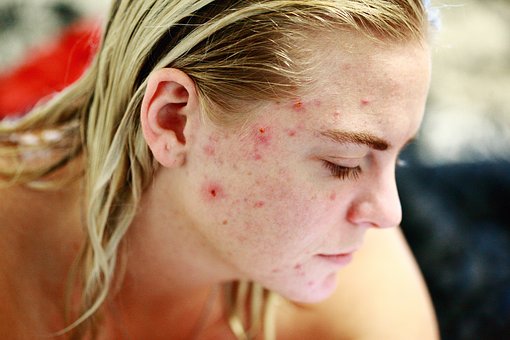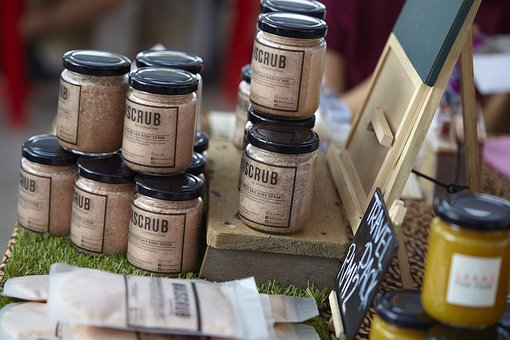I think everyone can agree that acne is annoying and frustrating. Sometimes, it shows up without warning and always at the wrong time – when you have an important presentation at work or when you want to impress your date. It just does not care about your plans! And most of the time, as much as you want to get rid of it, it just keeps coming back. So what should we do to stop it from showing up? To prevent these annoying little spots in the future, it is best to understand what is it and what caused it.

Pixabay.com
What is Acne?
Acne is a chronic skin condition that causes spots and pimples. It mostly appears on the face, back, neck, chest, and upper arms. It is not dangerous, but it can leave skin scars. There are six main types of spot’s caused by acne:
- Blackheads are small black (or yellowish) bumps, they appear black because the inner lining of the hair follicle produces pigmentation (coloring)
- Whiteheads have a similar appearance to blackheads but are usually firmer
- Papules are small red bumps that may feel sore
- Pustules are similar to papules, but with a white tip in the center
- Nodules are large hard lumps that build up beneath the surface of the skin and can be painful
- Cysts are the most severe type and carry the greatest risk of causing permanent scarring.
Nearly everyone suffers from acne at some stage in their lives. At least 85% of people between the age of 12 to 24 in the United States experience acne. Although it affects people of all ages, acne is most common with teenagers during puberty. A number of women also have acne in their 30s, 40s, 50s, and beyond.
Why do we get acne?
Acne happens when your hair follicles become clogged with sebum and dead skin cells. This clog gets infected with bacteria, which results in swelling. A pimple starts to grow when the plug begins to break down. According to research, the severity and frequency of acne depend on the strain of bacteria. Not all acne bacteria activate pimples. However, no one factor causes acne. The main cause is thought to be hormonal factors, but there are also other possible factors such as genetics, medications that contain androgen or lithium, greasy cosmetics, dairy products, environment, emotional stress, and menstruation.
How do we treat acne?
There is a myth going around that you can just let acne run its course and you do not have to treat it. It is important to know that it’s not always true. Because without treatment, dark spots can appear on the skin as acne clears. There are many effective acne treatments out there, which means nearly every case of acne can be controlled.
The treatment depends on how severe the acne is as mild acne can be treated with over-the-counter medications. The medications may contain active ingredients, such as resorcinol, benzoyl peroxide, salicylic acid, sulfur, Retin-A, and azelaic acid. Remember that acne treatment does not work overnight and it may take four to eight weeks to see an improvement. To prevent breakouts, you must continue to treat the skin.
For moderate to severe acne, it is advisable to visit a skin specialist or a dermatologist. The doctor may prescribe a gel or cream similar to over-the-counter medications but a lot stronger, or an oral medication or a topical antibiotic. Your doctor may also treat your acne with a procedure performed during an office visit, such as chemical peels, laser therapies, or acne removal.
What should we do to prevent acne?
Once your acne clears out, there is always a possibility for it to come back and ruin your day. Still, there are always things you can do to prevent this.

Pixabay.com
- Keep your face clean. It is very important to wash your face twice daily to remove impurities, dead skin cells, and extra oil from your skin. Avoid scrubbing harshly with a loofah, washcloth, or exfoliating glove. Gently wash it with your hands and always rinse well. Note that washing more than twice daily may do more harm than good.
- Be careful with what you put in your hair. Fragrances, oils, pomades, and gels on your hair can block your skin’s pores and irritate your skin if they get on your face. If you must use these hair products, apply them away from your forehead. Wash your hair often to prevent excess oil and keep it pulled away from the face.
- Always moisturize. Look for a moisturizer with ‘noncomedogenic’ on the label because it means it should not cause acne. Even when your skin is oily, you still need to moisturize. There are moisturizers for oily, dry, combination, or sensitive skin.
- Use makeup carefully. When your skin is breaking out, it’s best to avoid foundation, powder, or blush. But if you must wear them, wash them off at the end of the day and double cleanse your face. Before buying makeup, read the ingredient list and make sure they’re noncomedogenic.